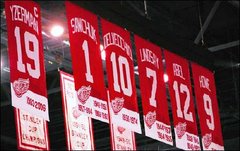
There were a lot of surprises during the Red Wings exciting run through the Stanley Cup playoffs. The most pleasant surprise, arguably, was the solid performance from veteran defenseman Andreas Lilja—a player many fans, including myself, weren’t expecting much from.
After all, this was a season that saw Lilja, 31, only play in 57 games, his lowest total since playing with Los Angeles in 2001-02 (26). He failed to register a goal and only had 5 assists for 5 points. This was the first season Lilja was held goalless since his rookie season in 2000-01 (Lilja only played in 2 games that season).
That’s not surprising given that Lilja’s game has never been based on offense, but the Wings organization and fans would liked to have seen some contribution offensively, as limited as it might have been. He was, however, a plus player with a respectable +6 and he kept his penalty minutes under control with 54. Before the season started, Coach Mike Babcock proclaimed Lilja was “the teams most improved player.” But on many nights during the regular season, Lilja was the odd man out—the seventh defenseman.
A ROCKY ROAD TO DETROIT
Lilja signed with the Red Wings before the 2005 season from Nashville. Coming to Detroit capped off a wild and scandalous year for the Swedish born defenseman. The lockout year didn’t start well for Lilja. During the lockout year, Lilja—like many NHL players—played overseas. Lilja played for the Swedish club Mora. In February 2005, a 22-year-old woman accused Lilja, along with NHL players Henrik Tallinder and Kristian Huselius, of raping her in her hotel room. Police opened an investigation into the trio on suspicion of sexual exploitation.
In March, one month later, after police dropped the charges due to lack of evidence, a special prosecutor re-opened the case. As a result of this new investigation, Lilja, Tallinder and Huselius were suspended from the Swedish national team for one year. In addition, Lilja was released outright by Mora for the rest of the season. All three admitted they had consensual sex with the woman, but they never raped her. In June, after a lengthy investigation, the special prosecutor cleared the trio when the prosecutor’s office could find no evidence that the three players forced the woman to have sex.
Before his release from Club Mora, Lilja had three goals and eight assists in 44. He played 11 games for Sweden, scoring three goals.
THE PLAYOFFS
Despite seeing sporadic playing time during the regular season, Lilja would be called upon to be the reliable, stay-at-home defenseman that the Wings needed. He would also be called upon to elevate his physical game—to utilize his size on a depleted defensive corp. The loss of two of Detroit's top four defensemen in Nicklas Kronwall and Mathieu Schneider was a major blow. Lilja would indeed be called upon. Simply put, Lilja answered the call.
Because of the injuries to Kronwall and Schneider, Lilja went from being a spare playing sporadically; to being one of the Wings top four defenders and playing in all 18 of the Wings playoff games. He averaged nearly 19 minutes (66th among defensemen) per game in the playoffs, a considerable increase from his regular season average of 15:14 (191st among defensemen).
In an area that was desperately lacking from the Wings—a strong, physical defensive presence—Lilja really stepped up his game. He led all Red Wings in hits with 55 and was second behind Sammy Pahlsson at the conclusion of the Western Conference Finals.
Then there’s that one blemish, that black-eye that will forever live in the minds of Red Wings fans and Lilja himself: “The Giveaway." It is the play that may very well have turned around the series. Lilja attempted to skate up the middle, in front of Hasek, when the puck bounced over his stick blade and right onto the tape of Duck’s forward Teemu Selanne. The rest is history. This was one area where Lilja struggled throughout the playoffs. He had 23 giveaways (third worst on the team).
Sure, Lilja made a mistake. A bad bounce, a great move by a talented forward and the game was over. But, to Lilja’s credit, he owned up to it in the locker room and addressed the media openly and honestly. And let’s not forget, in that same game, Lilja scored his first and only goal of the playoffs—and at the time, a very big goal. Had it not been for a fluky deflection off Lidstrom’s stick in the final seconds of regulation, it would have been the game winner.
Andreas Lilja was, in my opinion, the biggest positive surprise for the Red Wings this postseason. He made $1 million this past season and is another prime example of a Red Wing player whose on ice play far exceeded the value of his contract. This is what you want from your lower paid players in a salary cap system. Lilja truly gave the Red Wings the biggest bang for their buck. He exceeded everybody’s expectations with his smart, strong, physical play. As each playoff game wore on, you could add another label to Lilja: reliable. Lilja recognized the opportunity before him and he seized it.
Once the playoffs started, Lilja became a valuble part of the Wings deep playoff run. Was Andreas Lilja brilliant in these playoffs? No. Are there areas of his game that still need work? Yes. But did anyone, including die hard Red Wings fans and the “experts,” anticipate or expect a journey-man, No. 7 defenseman who played only a litte more than half of the regular season to emerge as one of the Wings more solid players on a lineup with future Hall of Famers? No way.
Over the course of 18 intense, grueling playoff games, one player surprised me more than the rest. Perhaps that earlier proclamation from Babcock came to fruition during this Stanley Cup Playoff run: Andreas Lilja really was “the teams most improved player.”





No comments:
Post a Comment